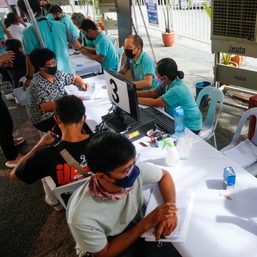SUMMARY
This is AI generated summarization, which may have errors. For context, always refer to the full article.

Senator Sonny Angara filed a bill that aimed to correct the Bureau of Internal Revenue’s (BIR) “erroneous” regulation slapping a 25% corporate income tax on private schools.
In a statement on Thursday, June 3, Angara said he filed Senate Bill (SB) No. 2272 as a response to BIR’s Revenue Regulation (RR) No. 5-2021, which would impose a 25% corporate income tax on private schools or propriety educational institutions.
This in effect canceled the 1% rate offered by the Corporate Recovery and Tax Incentives for Enterprises (CREATE) Act, a coronavirus pandemic rescue package that lowers corporate income taxes in the country.
SB 2272 would amend Section 27(B) of the National Internal Revenue Code (NIRC) of 1997, which Angara said contributed to the BIR’s faulty interpretation of a provision under CREATE.
Angara, who chairs the Senate committee on finance, said Section 27 (B) of the NIRC was vague as to whom the preferential tax rates apply to.
The BIR revenue regulation section states: “Propriety educational institutions and hospitals which are non-profit shall pay a tax of 10% on their taxable income.… Provided, that beginning July 1, 2020 until June 30, 2023, the tax herein imposed shall be 1%.”
In Angara’s bill, this section would be amended so it would explicitly say that “hospitals which are non-profit, and proprietary educational institutions” can avail of the 1% tax perk.
Angara said the BIR regulation had interpreted the CREATE law’s provision to mean that an educational institution should be both proprietary and non-profit to qualify for the preferential tax rate of 1% on their taxable income until June 30, 2023.
But he said this was faulty because “the term proprietary generally means one that is privately-owned and managed and run as a profit-making organization.”
“Thus, instead of shoring up proprietary educational institutions during the pandemic with the much needed reduction in the income tax rate from 10% to 1% sought under the CREATE Act, this erroneous regulation would instead subject them to the regular rate of 25%,” Angara said.
“The 25% was not imposed on schools in the past. Schools are among the hardest hit institutions during this pandemic. We can be more sensitive in our policies,” he added.
The Coordinating Council of Private Educational Associations already asked BIR to rectify its RR 5-2021, saying it “may force financially distressed schools to close down.”
Recto and Binay react
Senate President Pro Tempore Ralph Recto welcomed Angara’s bill, but stressed that, “Nothing, however, prevents the BIR from rectifying its oversight.”
“The bill corrects the ambiguity caused by a missing comma. It is an editorial correction to probably satisfy some grammar police. But in applying taxes, let the intent be the primordial consideration. One missing comma should not cause misery to many,” he said.
Senator Nancy Binay also voiced support for the bill.
“Tulungan natin silang maka-survive. Wag na nating padapain pa lalo ang mga private school na nagpupumilit na makabangon,” she said.
(Let’s help private schools survive. Let’s not kick these schools while they’re down, trying to get up.) – Rappler.com
Add a comment
How does this make you feel?
![[Ask The Tax Whiz] How to file annual income tax returns for 2023](https://www.rappler.com/tachyon/2022/11/tax-papers-hand-shutterstock.jpg?resize=257%2C257&crop_strategy=attention)




![[Ask The Tax Whiz] Are cross-border services taxed in the Philippines?](https://www.rappler.com/tachyon/2024/02/bpo-workers.png?resize=257%2C257&crop=72px%2C0px%2C785px%2C785px)
![[Ask the Tax Whiz] Ease of paying taxes law: What you need to know](https://www.rappler.com/tachyon/2023/02/calculate-february-22-2023.jpg?resize=257%2C257&crop_strategy=attention)

There are no comments yet. Add your comment to start the conversation.